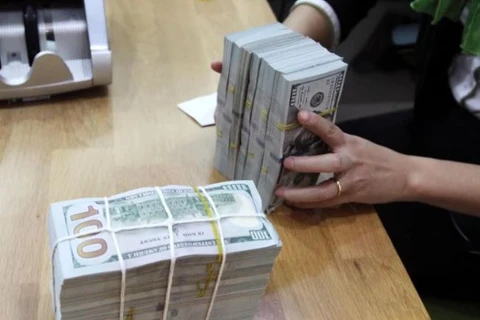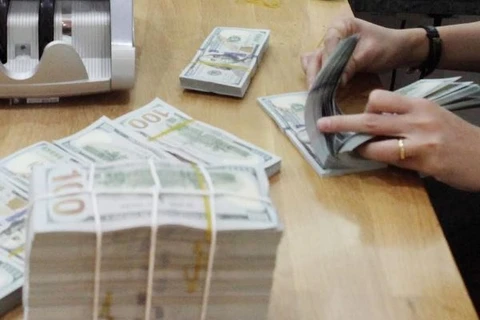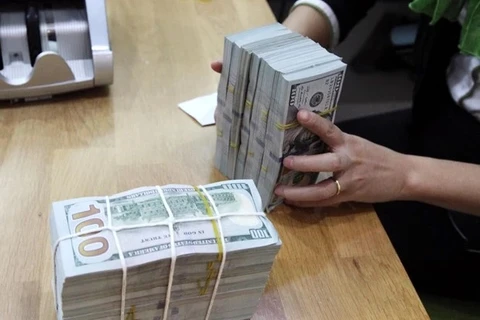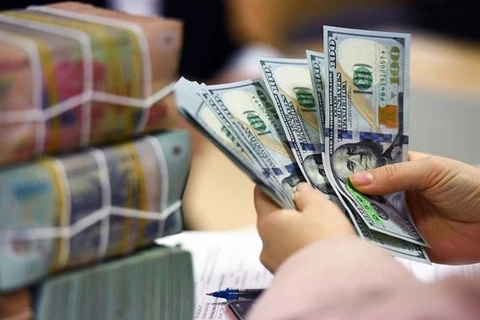Hanoi (VNA) – The State Bank of Vietnam (SBV) on April 23 took some moves like issuing treasury bills (T-bills), further employing T-bills as an open market operation (OMO), and stipulating liquidity and interest rates in the inter-bank market in the face of surging USD/VND exchange rates.
The central bank lent nearly 36 trillion VND (1.4 billion USD) for a 14-day term to nine members via the OMO channel. The bid-winning interest rate rose to 4.25% per year from 4% per year as recorded recently.
The seven-day loan, issued on April 16 via the OMO channel, also matured on April 23 with total value approximating 12 trillion VND.
The bank also continued to issue 2.15 trillion VND worth of 28-day T-bills with an interest rate of 3.73%. Two members won the bidding.
Besides, the T-bills issued on March 26 also became mature on April 23, enabling the central bank to inject 3.7 trillion VND back to the market.
Experts said the maintenance of inviting bids for T-bills will help the SBV form a steady zone of floor prices for inter-bank interest rates via bid-winning rates. The concurrent use of T-bills and OMO aims to serve the twin targets of guaranteeing liquidity for the banking system to maintain low interest rates in the market and easing pressure to narrow the USD/VND exchange rate differences in the inter-bank market.
Talking to the press, Tran Duc Anh, Director for macro-economy and market strategy at the KB Securities Vietnam JSC, held that the SBV has carried out many measures for stabilising exchange rates like attracting money flows via T-bills in the open market.
However, such moves are still not strong enough to stabilise foreign exchange rates as inter-bank interest rates keep growing. Therefore, the bank may take stronger interventions in the time ahead, he opined.
SBV Deputy Governor Dao Minh Tu affirmed that exchange rates form a critical factor in macro-economic governance. They affect not only the value of the Vietnamese dong or people’s purchasing demand but also policies, macro-economic stability, inflation control, market psychology, and investors’ trust.
Therefore, the SBV always views stipulating exchange rates as one of the extremely important tasks, he said, noting that it will continue flexible governance to ensure exchange rates changes in line with the common trend and the foreign currency balance is guaranteed for legal demand in the market.
On April 23, the central bank set the daily reference exchange rate at 24,275 VND per USD, up 3 VND from the previous day./.
The central bank lent nearly 36 trillion VND (1.4 billion USD) for a 14-day term to nine members via the OMO channel. The bid-winning interest rate rose to 4.25% per year from 4% per year as recorded recently.
The seven-day loan, issued on April 16 via the OMO channel, also matured on April 23 with total value approximating 12 trillion VND.
The bank also continued to issue 2.15 trillion VND worth of 28-day T-bills with an interest rate of 3.73%. Two members won the bidding.
Besides, the T-bills issued on March 26 also became mature on April 23, enabling the central bank to inject 3.7 trillion VND back to the market.
Experts said the maintenance of inviting bids for T-bills will help the SBV form a steady zone of floor prices for inter-bank interest rates via bid-winning rates. The concurrent use of T-bills and OMO aims to serve the twin targets of guaranteeing liquidity for the banking system to maintain low interest rates in the market and easing pressure to narrow the USD/VND exchange rate differences in the inter-bank market.
Talking to the press, Tran Duc Anh, Director for macro-economy and market strategy at the KB Securities Vietnam JSC, held that the SBV has carried out many measures for stabilising exchange rates like attracting money flows via T-bills in the open market.
However, such moves are still not strong enough to stabilise foreign exchange rates as inter-bank interest rates keep growing. Therefore, the bank may take stronger interventions in the time ahead, he opined.
SBV Deputy Governor Dao Minh Tu affirmed that exchange rates form a critical factor in macro-economic governance. They affect not only the value of the Vietnamese dong or people’s purchasing demand but also policies, macro-economic stability, inflation control, market psychology, and investors’ trust.
Therefore, the SBV always views stipulating exchange rates as one of the extremely important tasks, he said, noting that it will continue flexible governance to ensure exchange rates changes in line with the common trend and the foreign currency balance is guaranteed for legal demand in the market.
On April 23, the central bank set the daily reference exchange rate at 24,275 VND per USD, up 3 VND from the previous day./.
VNA

























